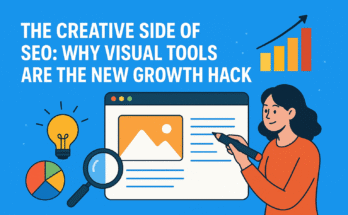In today’s digital landscape, simply having a website is not enough. If your target audience can’t find your site through search engines like Google, your business may struggle to grow online. That’s where Search Engine Optimization (SEO) comes in.
SEO is more than just a buzzword; it’s a powerful strategy that helps improve your website’s visibility, attract organic traffic, and boost credibility. Whether you’re a small business owner, content creator, or marketer, understanding SEO is essential for success in the digital world.
Table of Contents
What is SEO?
SEO (Search Engine Optimization) is the process of optimizing your website to rank higher in search engine results pages (SERPs) for relevant keywords. The goal is to increase the quality and quantity of organic (non-paid) traffic to your site.
SEO involves a combination of technical practices, content creation, link-building, and user experience improvements to help search engines understand and recommend your content to users.
There are three main types of SEO:
-
On-Page SEO: Optimizing the content and structure of your web pages (e.g., keyword usage, meta tags, headers).
-
Off-Page SEO: Enhancing your website’s reputation through backlinks, social media signals, and online mentions.
-
Technical SEO: Improving the backend elements like site speed, mobile-friendliness, crawlability, and indexing.
Why Is SEO Important?
1. Increases Organic Traffic
One of the biggest advantages of SEO is increased visibility. Websites that rank on the first page of search results receive the majority of clicks. In fact, studies show that the first five organic results on Google get more than 67% of all clicks.
By targeting the right keywords and optimizing your content, SEO helps attract visitors who are actively searching for your products or services.
2. Builds Trust and Credibility
People trust search engines. When your site ranks high in search results, users are more likely to see your brand as credible and authoritative. High-quality content, backlinks from trusted sites, and positive user experiences all contribute to better rankings and stronger brand reputation.
3. Cost-Effective Marketing
Unlike paid advertising, which requires continuous investment, SEO offers long-term benefits. Once your site is optimized and starts ranking, you can enjoy consistent traffic without spending on clicks or impressions. It’s an efficient way to grow your online presence without breaking the bank.
4. Improves User Experience
SEO isn’t just for search engines; it’s also about creating a better experience for users. Factors like fast-loading pages, mobile responsiveness, easy navigation, and quality content enhance the overall user experience—which in turn can reduce bounce rates and increase conversions.
5. Provides Valuable Insights
SEO tools like Google Analytics, Search Console, SEMrush, and Ahrefs offer detailed insights into user behavior, keyword performance, and website traffic. This data can help you make informed marketing decisions, understand your audience better, and fine-tune your content strategy.
Key Elements of SEO
1. Keyword Research
Keyword research is the foundation of any successful SEO strategy. It involves identifying the terms and phrases your target audience uses to search for information online. Tools like Google Keyword Planner, Ubersuggest, and Ahrefs help discover high-volume, low-competition keywords to target.
2. Quality Content Creation
Content is king in SEO. Search engines prioritize websites that provide valuable, relevant, and original content. Incorporating keywords naturally, addressing user intent, and structuring content for readability are all essential for content optimization.
3. On-Page Optimization
This includes optimizing individual web pages with:
-
Keyword-rich titles and meta descriptions
-
Header tags (H1, H2, H3)
-
Internal linking
-
Image alt text
-
Clean and SEO-friendly URLs
4. Backlinks
Backlinks, also known as inbound links, are links from other websites pointing to your content. Search engines consider backlinks as votes of confidence. Earning backlinks from reputable sources can significantly boost your SEO rankings.
5. Technical SEO
Technical SEO ensures that your site is easy for search engines to crawl and index. Key aspects include:
-
Fast page speed
-
Mobile-friendliness
-
Secure connection (HTTPS)
-
Proper use of XML sitemaps and robots.txt
-
Structured data (schema markup)
Common SEO Mistakes to Avoid
-
Keyword Stuffing: Overusing keywords can harm readability and rankings.
-
Duplicate Content: Search engines penalize sites with copied or duplicate content.
-
Ignoring Mobile Optimization: Most users access websites via mobile; ignoring this can hurt your rankings.
-
Slow Page Speeds: Slow-loading websites result in higher bounce rates and lower search rankings.
-
Poor Link Building: Low-quality or spammy backlinks can lead to penalties.
How SEO Benefits Different Types of Businesses
-
E-commerce Sites: Increases product visibility and drives targeted traffic.
-
Local Businesses: Helps rank in local searches (e.g., “plumber near me”).
-
Blogs and Content Creators: Boosts readership and engagement.
-
Startups: Builds brand awareness and establishes online presence early.
The Future of SEO
SEO is constantly evolving with search engine algorithms becoming more sophisticated. Google’s focus on user intent, voice search, AI-driven content, and mobile-first indexing means that staying updated is key.
Emerging trends include:
-
AI and Machine Learning (e.g., Google’s RankBrain)
-
Core Web Vitals (page experience signals)
-
Visual Search and Video SEO
-
Voice Search Optimization
To stay competitive, businesses must adopt a holistic and adaptable SEO strategy that aligns with both technical standards and user expectations.
Final Thoughts
SEO is no longer optional—it’s a critical component of digital success. By understanding and implementing the core principles of SEO, you can improve your site’s visibility, drive more organic traffic, and build a trusted brand.
Whether you’re just starting out or looking to scale, investing in SEO is a smart, sustainable way to grow your online presence and reach the right audience at the right time.
Need Help With SEO?
If you’re unsure where to start, consider working with an SEO specialist or digital marketing agency. They can audit your site, develop a customized strategy, and guide you through the ever-changing world of search engine optimization.


